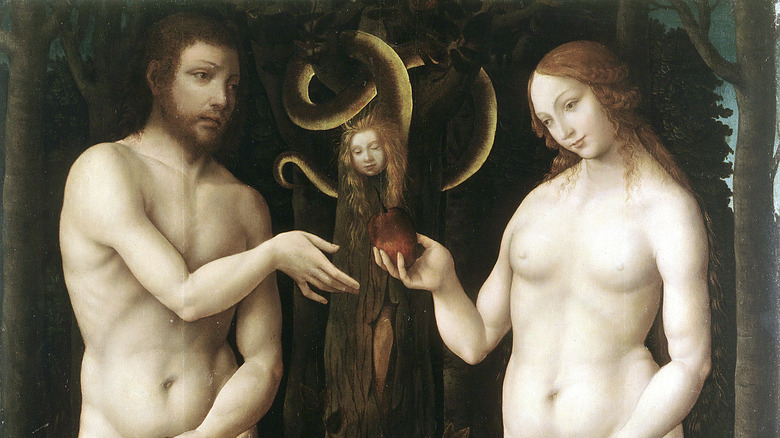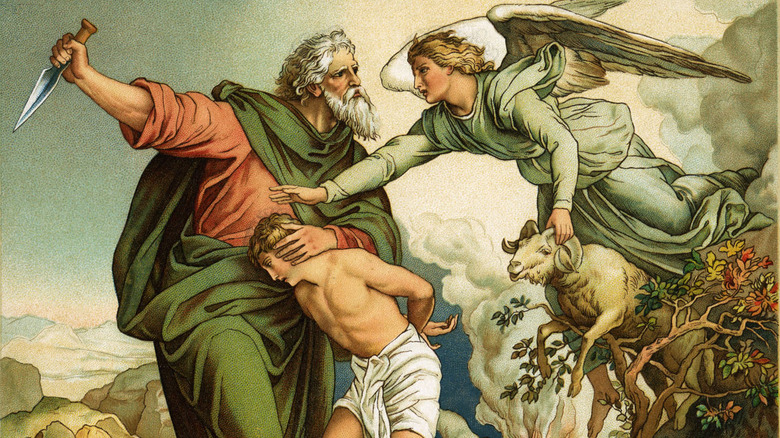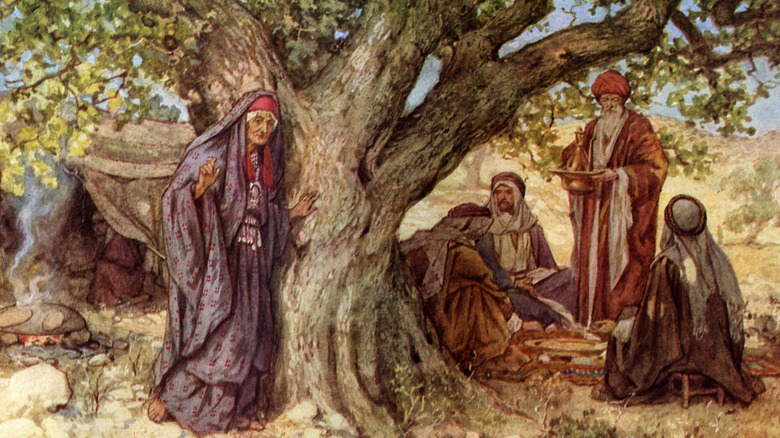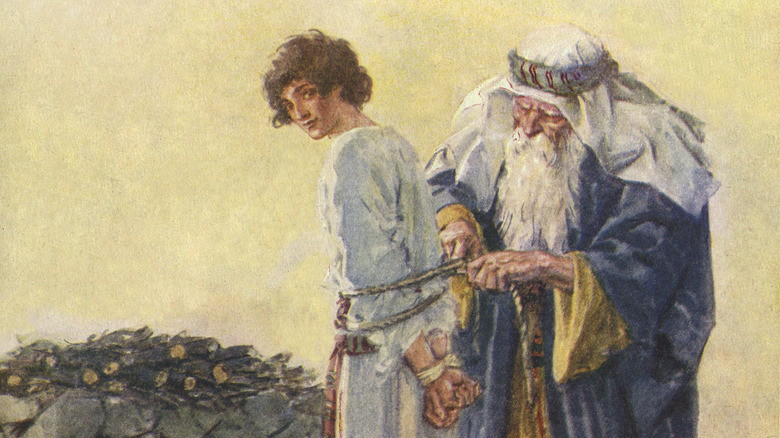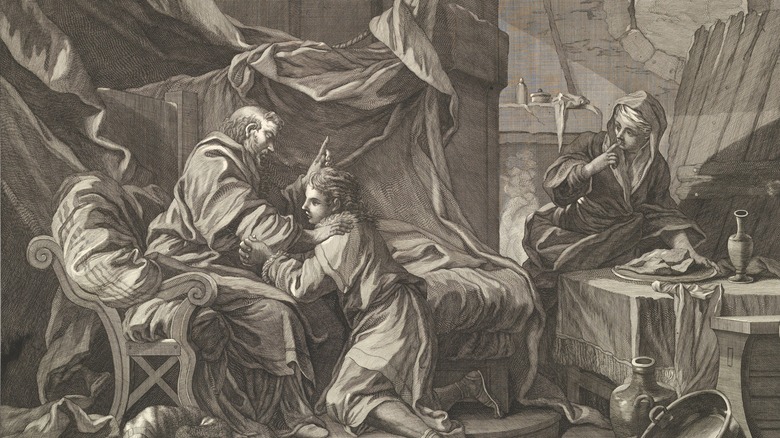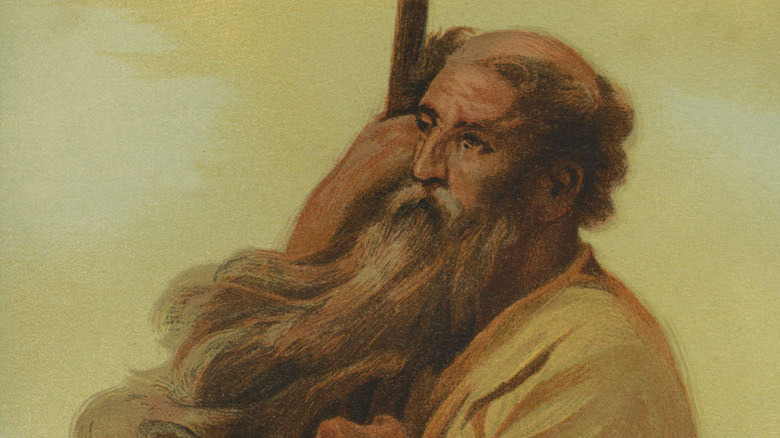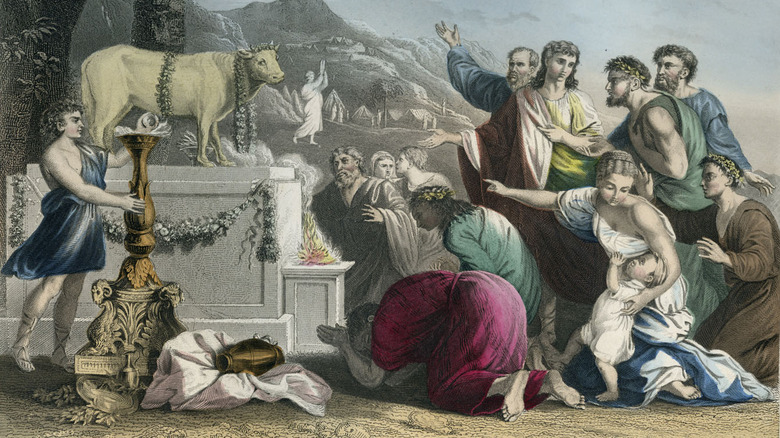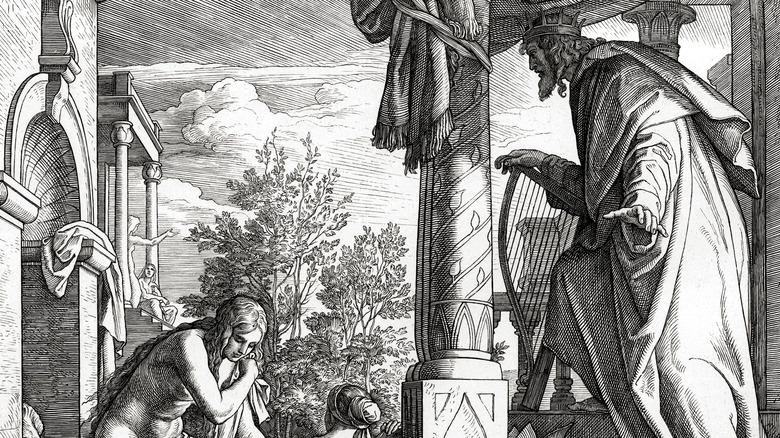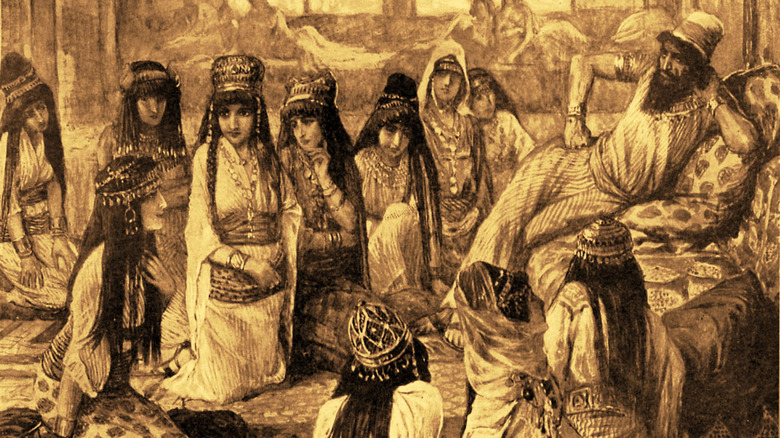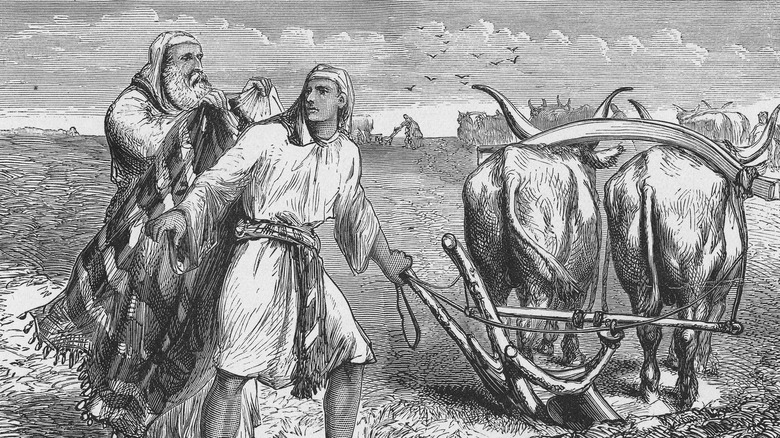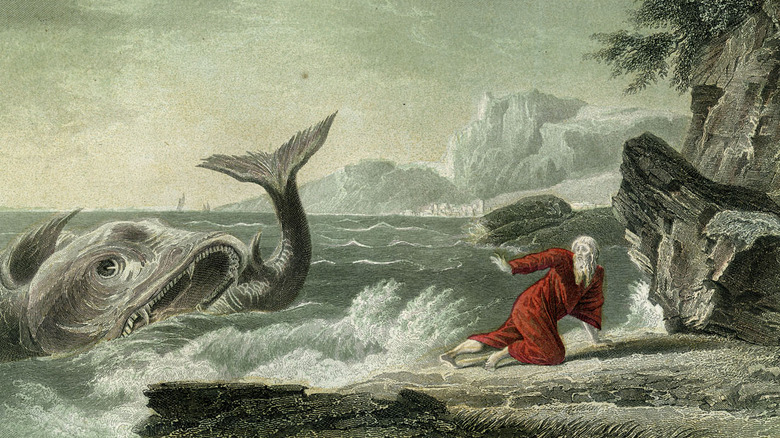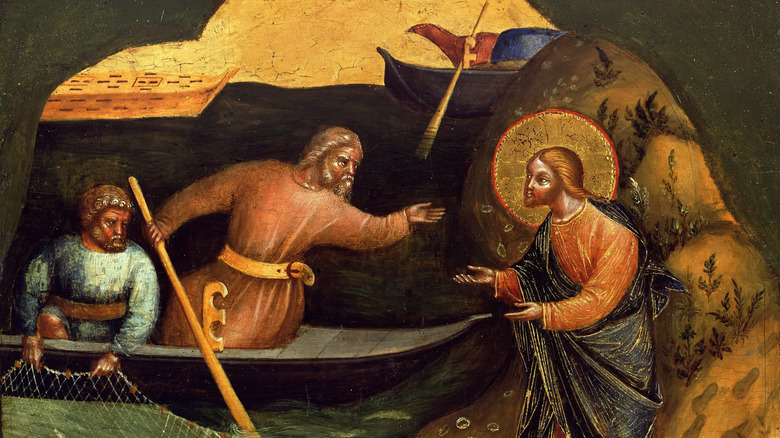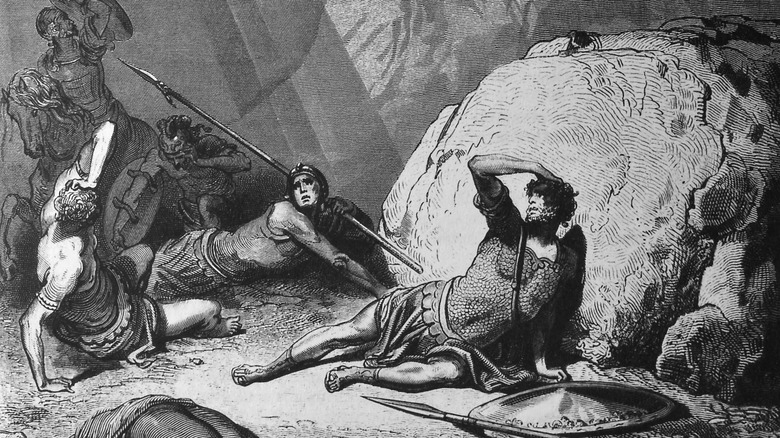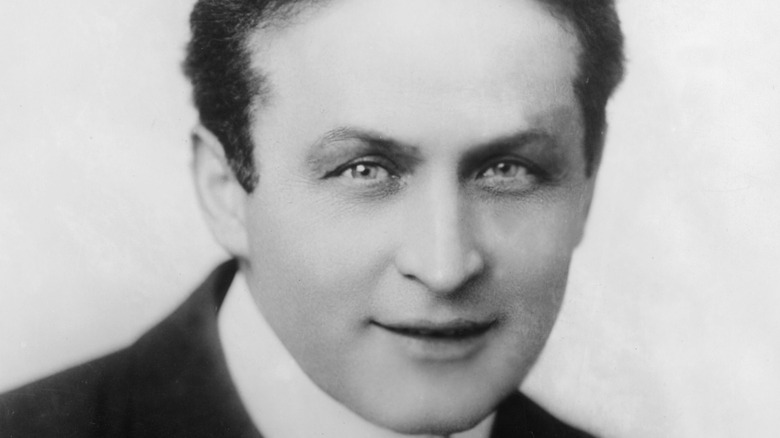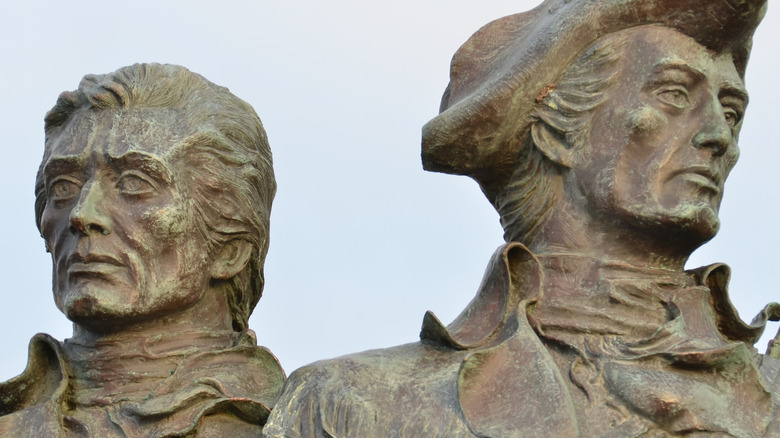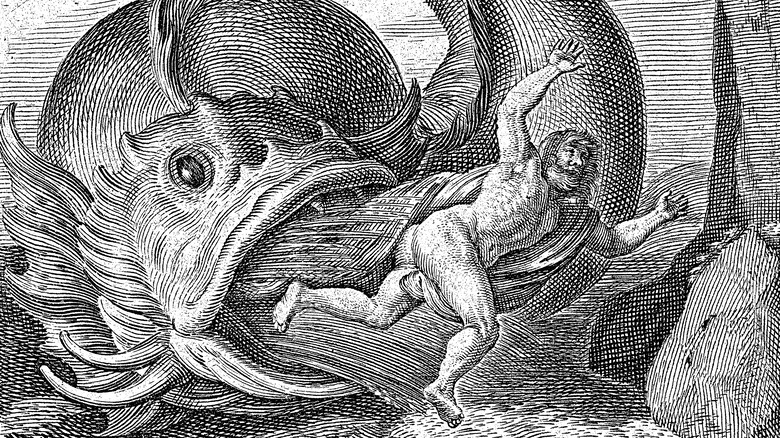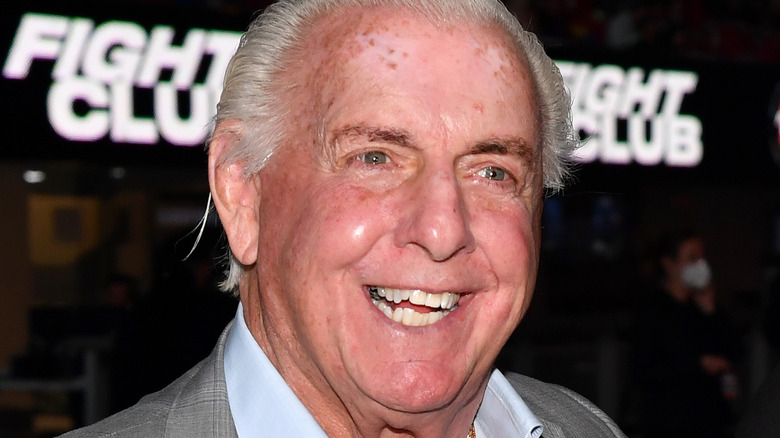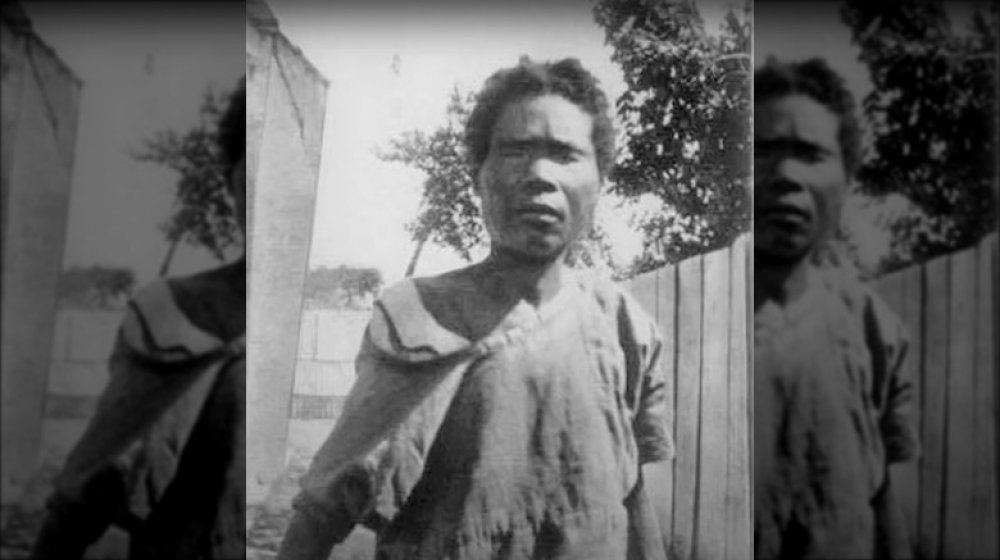
Respected People In The Bible Who Actually Weren’t That Great
The Christian Bible is a complex text, which was written and collated in a very different historical period within a drastically different cultural and social milieu, notes The Torah.com. Not to mention, the original text was written in Hebrew, Greek, and Aramaic — languages that use words and concepts that do not always have a one-to-one correlation with an English translation (via Britannica). It, then, becomes very easy within a new time period and a new language to get ideas, events, and people lost in translation.
With all that being said, the Christian scripture is filled with revered heroes who have informed the faith and sanctification (or holiness) of those who claim to follow Jesus. Yet, on closer inspection of the text (and with the help of commentaries and extra-textual information), it becomes increasingly clear that these heroes of the faith are kind of … bad people. Thomas Watson, a Puritan preacher and author, once said, “God can strike a straight stroke by a crooked stick” (via Stem Publishing). All of the “heroes” of the Bible point to the perfect person of Jesus who, according to the Bible, died to save the world, as written in John 3:16-21 NKJV.
Adam and Eve
When God made Adam, he recognized that he needed relationship, he needed another human, so out of Adam’s rib, he made Eve. They lived together with the animals in the Garden of Eden in perfect communion with God. Yet Genesis, Chapter 3, tells us that Adam and Eve were deceived by the serpent to eat of the Tree of the Knowledge of Good and Evil, the one tree that God told them to stay away from. They both did so, and God brought down the consequences of their actions upon them: a curse and ejection from the Garden. As Christianity.com speaks to, they literally hadeverything, and they decided they wanted the one thing they could not have. Their greed and pride and desire to be like God led to The Fall: the curse upon humanity (sin) and the brokenness of creation.
In this way, Adam is seen as what Christian theologians call a “type” (via Christian Courier). He was the first human made in God’s image and the origin of sin and brokenness. Adam and Eve are humanity’s forebears, lovingly created, and all of the evil and brokenness seen now, according to Christian tradition, is on their hands. Even then, Adam was figured by Saint Paul as “a type of Him who was to come” (Romans 5:14 NKJV).
Abram (Abraham)
According to Herbert Lockyer’s “All the Men of the Bible,” Abraham was the “father of the faithful” and “friend of God.” Genesis speaks of Abraham’s strong faith and obedience towards the call of God, to the point of sacrificing his own promised son, Isaac. This, in most modern eyes, is enough reason to cancel him as being any kind of significant leader or moral figure. Yet, Aaron Hollander at Swarthmore College, in an essay on Søren Kierkegaard’s reading of this story, breaks down the complexity of this event and how it both points to the faithfulness of Abraham but also “his act [as] an ethical rupture … the sacrifice of ethics to obligation.” It’s seldom as binary as “right” and “wrong.”
Even if one is able to move beyond the character difficulties of this one act, it is hard to look past Abraham’s other character flaws. Twice he tricked rulers into believing his wife Sarah was his sister, which was only partially untrue — she was his half-sister, or perhaps his niece, according to The Jewish Women’s Archive. Either way, his deceit was exposed by God in both situations, and the rulers, the pharaoh and Abimelech, who took Sarah in thinking she was unmarried either suffered due to this deceit or feared the consequences they would have suffered in the case of Abimelech (Genesis 12:10-20 and Genesis 20:1-6 NKJV). Abraham’s decision not only forced his wife into compromising situations but would have brought complete ruin on the rulers of those kingdoms.
Sarah
According to The Jewish Women’s Archive, Sarah is the “ancestress of all Israel.” She is the mother of the promised son, Isaac. It is important to recognize how God chooses to bring forth the promise through the womb of Sarah, which harkens back to the words of God spoken to Eve after the fall in Genesis 3. She was revered within the lineage of Jesus, because it was women God would choose to bring forth the fruit of divine promise.
Yet her “barrenness,” according to Lisa F. Cunning, “is an archetype of the point where hopelessness meets hope.” She had lost hope that she would have a child, so she offered her servant, Hagar, to her husband, Abraham, as essentially a surrogate. At that point Sarah became despised in the eyes of Hagar, and “Sara[h] dealt harshly with her” (Genesis 16:6 NKJV) and placed the blame on Abraham in the previous verse, even though she had been the one to encourage this act.
Naomi Steinberg, associate professor of religious studies at DePaul University, states that Hagar did not give consent to this decision, and this becomes an issue of “upper classes exploiting those with fewer options” (via U.S. News & World Report). Her choice in this moment becomes an origin for many of the problems within Israeli/Palestinian and Christian/Muslim conflicts seen today.
Isaac
It’s uncommon to find many representations of Isaac, the son of Abraham and Sarah, that don’t involve his near death at his father’s hands or the deceit of his own son, Jacob. In some ways, being a “promised one” kind of sucks, or at least taking Isaac as an example of a “type,” he is a rather pitiable one within the greater narrative of the Bible. Though, according to Herbert Lockyer’s “All the Men of the Bible,” “too the credit of Isaac it must be said that he was the only one of the patriarchs who had but one wife.” Clearly, he was singularly devoted to his wife, Rebekah.
Within the big scheme of history, there has been no shortage of daddy issues. Isaac ends up following in the deceitful footsteps of his father to protect himself from being killed on account of his wife. When approached by “the men of the place” about his beautiful wife, he declares Rebekah to be his sister like his father did with Sarah. Abimelech (more than likely a different one than the one who confronted Abraham) noticed Isaac “showing endearment to Rebekah his wife” and confronts Isaac about it (Genesis 26:1-30 NKJV). As Bible.org states it, “nevertheless, [Abimelech] viewed the taking of a man’s wife as sin, and one of great consequence. Abimelech seemed to regard marital purity higher than Isaac did.” It’s never good when a ruler has better ethics than a man of faith.
Jacob
Isaac’s son Jacob would come to be known as the father of the 12 tribes of Israel named after his sons (Genesis 49:1-28 NKJV) and the only character in the Bible to wrestle with God or an angel of God (Genesis 32:22-32). Eventually these tribes would form the nation of Israel, which would divide and unite numerous times throughout history. It is not fully agreed upon within scholarship how these divisions came about or how consolidation took place, according to The Jewish Virtual Library. Yet it is this nation of people that becomes the people of God, the Hebrews, a central collective identity within the scope of the whole Bible.
However, Jacob was far from a saint at any point in his life. He was overly controlled by his mother Rebekah, who viewed Jacob as her favorite son even though their oldest was Esau (via Herbert Lockyer). He was quite selfish even though he was faithful to God unlike Esau. He would not give Esau food without negotiating for Esau’s birthright, as well as stealing Esau’s blessing by falsely acting as his brother (at the behest of his mother) before a blind Isaac. According to Theology of Work Project, “Courageous and astute decisions that result in success may be rightly praised for their sheer effectiveness. But when profit comes at the expense of exploiting and deceiving others, something is wrong.” Jacob was often looking for the best way to exploit a situation.
Moses
Moses is probably the first name that comes to mind behind Jesus, and perhaps Saint Paul, when one thinks about the Bible. According to Herbert Lockyer’s “All the Men of the Bible,” “it would take a volume in itself to fully expound the virtues and vicissitudes of Moses the historian, orator, leader, statesman, legislator and patriot. His greatest honor, however, was the privilege of being known as ‘the friend of God.'” Not to mention his first act was to free the enslaved Hebrews from the Egyptian pharaoh, a story which has soaked deeply within the fabric of American society.
Yet for all of Moses’ great qualities, he, too, was not a simple hero but was often known for his anger and his dependence on himself instead of God. When the Hebrews wandered in the desert for 40 years, two separate generations were under the leadership of Moses during this time. In Exodus 17:1-7 and Numbers 20:1-13, Moses strikes water from a rock, yet in the second of these two instances he is talking to a new generation and does not give credit to God. According to Deborah Miller, “instead, [Moses] calls them “rebels,” distancing the people from himself and, by association, from God; disdaining their legitimate needs; and losing the opportunity to attribute the provision of water to God.” This anger and specific lack of dependence on God would lead to God prohibiting him from seeing the Promised Land.
Aaron
Aaron, Moses’ brother and spokesperson for most of their time in the wilderness, was the first priest along with his sons. He became another “type” of Christ, a version of a mediator Christ (via Herbert Lockyer). Aaron is the first physical representation of this reality, something that Jesus would perfectly fulfill in his own time. The image of mediation is significant within the scope of the Bible. According to International Standard Bible Encyclopedia, “it has reference to the method by which God and man are reconciled through the instrumentality of some intervening process, act or person, and especially through the atoning work of Jesus Christ.”
Yet Aaron mislead the people as a priest while Moses went up on Mt. Sinai to commune with God. The people grew impatient and started to grumble, so Aaron made a Golden calf for the people to worship. Aaron, the mediator between God and people and between Moses and the people, caused them to worship a false god, a god that was man-made, thereby causing the anger of Moses and God (Exodus 32 NKJV).
David
King David was a “man after God’s own heart,” notes Christianity.com. Perhaps one of the most solid examples of faithfulness within the Bible — from his lowly roots as a shepherd to his time being chased and nearly killed by King Saul, to his time as the king over a united Israel (via National Geographic). David was one of the few figures who seemed nearly perfect within the scope of the Biblical narrative — that is until he assaulted the wife of one of his soldiers.
“Over the course of history, this encounter between David and Bathsheba has often been described as adultery, which implies mutual consent. However, as we examine the details, we see that it is actually sexual abuse of power … Neither the text nor the context supports the conclusion that it was an affair between two consenting adults,” writes the Theology of Work Project. King David should have been with his troops in the first place, not leering at someone else’s wife. If there’s anything to be learned from the mistakes of Abraham and Isaac, then it’s quite obvious what the consequences of this violent act will be in the sight of a just God. Yet the faithful king gives in to his worst nature nonetheless.
Solomon
King Solomon, the son of King David and Bathsheba, was given great wisdom by God due to his request in 1 Kings 3 for guidance in governing God’s people. He was a great judge and leader. “The Bible says that Israel grew prosperous under Solomon, and indeed there is evidence that the Levant was experiencing strong economic growth as regional trade increased in the region. Wealth poured into his treasury, allowing Solomon to fulfill God’s promise to David: to build a temple to house the Ark of the Covenant” (via National Geographic).
Yet Solomon had 700 wives and 300 concubines in his harem. These wives were probably not all for pleasure but a type of business transaction to gain land, resources, and more, notes the Jewish Women’s Archive. Nonetheless, God spelled out clearly in Deuteronomy 17:17 that man should not have more than one wife. According to Herbert Lockyer’s “All the Women of the Bible,” “[Solomon] loved many ‘strange women, that is, women of different nationalities, apart from Israel. … His wives turned his heart toward other gods, and because of his idolatry accruing from such a strong female influence, God said that at his death He would rend Solomon’s magnificent kingdom in two.” Not to mention his devotion or care for any one of the 1,000 women was probably nonexistent at best. His drive for power and greed overcame his faithfulness to God and respect for others.
Elisha
To be a prophet of God was a position of high esteem even if it did not end with accolades or adoration from the people they were speaking to. Elisha did many of the things that his more famous mentor, Elijah, did, including helping in military matters and curing people. According to Sara Ronis at My Jewish Learning, Elisha was an advocate for
socially and economically vulnerable individuals. “One of Elisha’s first acts as prophet is to turn a foul water source into a freshwater source, thereby making the town of Jericho sustainable and self-sufficient.”
Yet in 2 Kings 2: 23-25, when some young kids from Bethel call him a “baldhead,” Elisha calls down two female bears to maul the youths. If one just reads the surface of this, it seems like Elisha might be a little too vain. However, Chad Bird at 1517 breaks down the meaning behind to story: They probably were young men, not small boys, and “Bethel became basically one big uplifted middle finger to everything Moses had commanded,” which meant that this story had more to do with the old war of gods than an insult. This was Elisha calling down a curse on people actively choosing false gods. But it remains a violent way for him to make a point.
Jonah
Like Elisha, Jonah was called by God to be a prophet to Ninevah. He was one of the many prophets to have their own book, and it is perhaps one of the most memorable stories of all of the biblical prophets. Jonah being in the belly of a fish for three days and three nights is itself an allusion to Jesus being in the tomb for three days and three nights, notes Christianity.com. However, Jonah is known for being the reluctant prophet even though he maintains the esteem that comes with being a prophet of God.
Robin Payne from the Expository Times maintains that Jonah becomes a caricature of a prophet in that he runs away from his calling to preach and warn the people of Ninevah of God’s judgment. When he prays he is praying for himself and not others. He is deeply self-centered and actively wants Ninevah to be destroyed. Yet, according to 2 Kings in the Bible, Jonah did preach the words to other people and places. According to the Matthew Henry Commentary, it “is recorded chiefly for the sake of Christ, of whom Jonah was a type; it contains also very remarkable instances of human infirmity in Jonah, and of God’s mercy both in pardoning repenting sinners, witness Nineveh, and in bearing with repining saints, witness Jonah.”
Peter, the Apostle
Saint Peter is considered “the rock” upon which the Christian church is built, according to Catholic theology, while Protestants would say that the rock spoken of in Matthew 16 was actually Jesus (via Catholic Answers). Regardless of whether one is Catholic or Protestant, Peter remains a central character and saint within the wider universal church. Yet even Peter was not free of doubt or fear.
When Jesus was delivered to the authorities to be crucified, Peter denies knowing Christ three separate times out of self-preservation (Luke 22:54-62 NKJV). He knew that if the authorities knew he was one Jesus’ followers, he more than likely would be put down just like his teacher. Popular philosopher Rene Girard gives an interesting reading of this tale, according to Joachim Duyndam: “According to Girard, Peter’s denial (‘I don’t know the man you speak of’) demonstrates not so much his being a brazen liar, but his desire for belonging to a community.” The majority “community” ends up calling us away from truth towards acceptance according to this thought. Regardless of the reading, this behavior was not new for Peter.
Paul, the Apostle
Paul, once called Saul, became the central author of most of the New Testament epistles and remains one of the most influential saints of the universal Christian church. His theological connections and reflections continue to give anew to followers of Jesus throughout history and even today. Yet Paul was notoriously self-reflective and self-deprecating about what he did before his major conversion on the road to Damascus (Acts 9 NKJV).
The Catholic Exchange puts Paul’s acts prior to conversion this way: “Saul, a young Pharisee consumed by zeal, pursued a program to purge Jerusalem — and every Jewish community — of any trace of Jesus’ teaching or influence.” Similarly, Herbert Lockyer describes Paul this way: “Enthusiastically Paul endeavored to stamp out the Christian faith. There is no evidence, however, that he himself killed anyone.” While it wasn’t violent persecution of the Christian church, he had a clear disdain for the followers of Jesus, which makes his conversion all the more surprising and his legacy even more intriguing. Few characters in the Bible show the mercy of God more effectively.
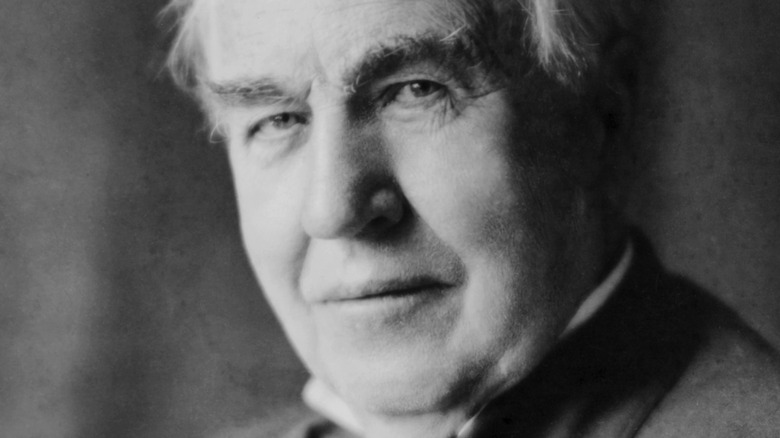
11 Best Thomas Edison Inventions
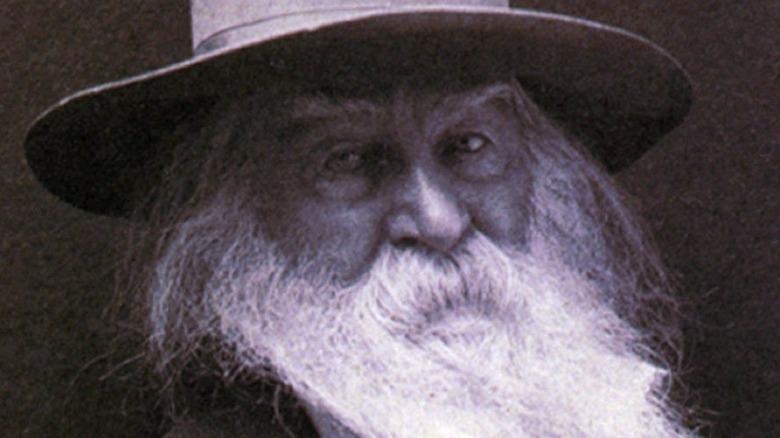
The Untold Truth Of Walt Whitman

The Real Reason You Weigh Less Near The Equator

How Saddam Hussein Was Even More Evil Than You Think
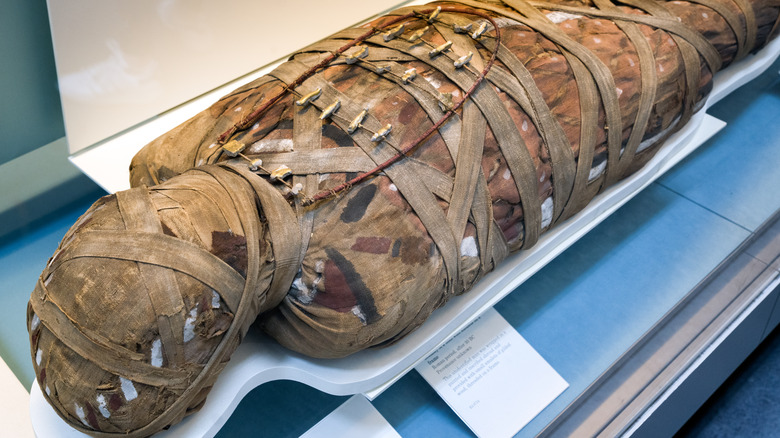
What Experts Think Elite Egyptians Once Did To Lower Class Mummies

The Tragic Murder Of Dylan McDermott's Mother

How The Casanova Killer Romanced His Victims To Death

The Scary Weapon People Can Create With 3D Printers

The Queen Pays Taxes Even Though It's Not Required. Here's Why

The Truth About Antarctica's Pyramids
